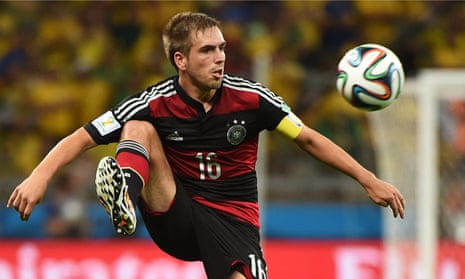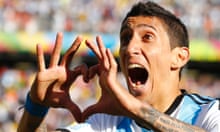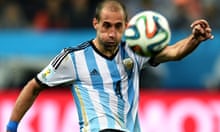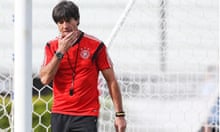Philipp Lahm was 11 years old when he joined Bayern Munich. He arrived at Säbener Strasse full of enthusiasm and with the diminutive attacking midfielder Mehmet Scholl as his hero. The only problem was that Lahm soon found himself playing at full-back. The youngster had to rethink, he had to adapt. “I quickly realised that I couldn’t have Mehmet as my role model any more,” he once said, “so I changed it to Paolo Maldini instead.”
Quick-thinking and versatile; Lahm at 11 and Lahm at 30. Nothing and everything has changed. His ability to adapt remains but, whereas back then he was an ambitious young man, now he stands on the verge of greatness. All that he needs is a victory against Argentina on Sunday at the Maracanã and he is there.
A win for Germany would allow Lahm to join such luminaries as Diego Maradona, Franz Beckenbauer and Lothar Matthäus on the list of only 20 World Cup-winning captains. Lose and Lionel Messi will take that place. It is a fact that will not be lost on Lahm. He may be quiet and he may be understated, but he is ruthlessly competitive with a relentless drive towards one aim: to succeed.
Both Lahm and Messi have won their domestic leagues and cups several times and have won the Champions League. Both are wonderful players and have been called “perfect footballers”. Interestingly, though, only one of them was described by Pep Guardiola as the “most intelligent player I have ever managed”. That player is Lahm.
True, that comment was made early in Guardiola’s spell as Bayern manager and perhaps it was just a way of endearing himself to his new captain, but there is no doubt the former Barcelona manager adores Lahm. And why shouldn’t he?
Lahm’s extraordinary versatility makes him a dream player for any manager. Is he perfect? Possibly. In March of this year the German press certainly used such phrases as “perfect” and “Mr 100%” after the Bayern captain had emerged from the Bundesliga game against Hertha Berlin with a 100% accurate pass rate. He had passed the ball to his Bayern team-mates 133 times and not missed a single one. Detractors will say that most of those passes will have been short, sidefooted and sideways but that seems harsh. Guardiola, for one, would not listen. “It is just impossible to play better than Lahm has in that position [No6] over the last couple of games,” the Spaniard said around that time.
Barcelona’s Xavi Hernández is also an admirer. “Lahm is a top player with a lot of personality and you can play him at the back, in the middle and he is good going forward. He is clearly not stopping in his pursuit to simply get better and better.” The former Brazilian full-back and World Cup-winning captain Carlos Alberto once said: “Sometimes Lahm is just breathtaking. He doesn’t make any mistakes. Is he a machine? No, Weber, Schulz, Höttges, in my day, they were machines. Philipp Lahm is an artist.”
It is difficult to disagree. There was a wonderful moment during the 7-1 win over Brazil when he danced into the penalty area, dropped his shoulder, appeared as if to shoot before teeing up André Schürrle for the Chelsea player’s first goal. He looked like he had been playing at No10 for the best part of his career.
Yet there was a time when Lahm was not as highly rated. Like most footballers during his teenage years, there were question marks over whether he would be able to break into the first team. Hermann Gerland, a former footballer who has worked with Bayern’s youth and amateur teams since 2001 and is now the co-coach at the German champions, remembers a story from when Lahm was 17. “Lahm was a perfect footballer even at that age,” he told the local paper tz. “But no one wanted him. I offered him out on loan. One manager [even wanted me to reimburse him for the petrol money he had spent to come and watch Philipp [because he was unimpressed]. A few years later I met the same manager in Berlin so I took out my wallet and said: ‘Now, young man, how much did you want for that trip?’”
In the end, Gerland found someone to take on the young talent. Lahm joined Stuttgart on loan for two seasons in 2003. He played 53 Bundesliga games and was part of the team who finished fourth in the league under Felix Magath in 2004. When he returned to Bayern he quickly established himself in the first team. “I am not sure he is capable of having a bad game,” Gerland says.
Lahm made his league debut for Bayern during the 2005-06 season and was an integral part of the team the next season. He has won five Bundesliga titles, five German Cups, the German Super Cup twice and the Champions League, the European Super Cup and the Fifa Club World Cup. Of those 15 titles, eight have been won with Lahm as the captain of Bayern and herein lies a slight dichotomy within his personality. For all his apparent modesty and softly spoken nature he clearly craves being a leader.
When he turned down Barcelona in 2008 the most important thing to Lahm was not his salary but his standing in the Bayern hierarchy. Not long after declining the Catalans’ offer, against the advice of his adviser, he said: “It could be that my personality had been underrated. For me it was important to know how Bayern see me. And there were times when I had the impression that my opinion wasn’t 100% appreciated all the time. Now, after several good discussions, I have the feeling of being an important part of the Bayern puzzle. And that was very important to me.”
Around that time, he was also looking to extend his influence in the Nationalmannschaft. Again, he went about it quietly, modestly, but one wonders what Michael Ballack, who was captain at the time, must have thought. After the defeat against Croatia in the group stage of Euro 2008 he was asked by the magazine 11Freunde whether he spoke at the team meeting following the game. “Of course I said something,” Lahm replied. “And when you get the feeling that you are listened to by the team you notice that you slowly grow into the role of a leader. And as luck would have it we improved.”
He was then asked whether a player grows into the role of the leader or if he suddenly decides he wants to be captain. “Both,” Lahm said. “I came into the national team when I was 19 and I didn’t have the experience to be able to be part of the discussions then. Now I am still quite young but am quite an experienced footballer and when you always perform then you have to somehow look after your own interests as well. I am ambitious and I want to achieve things and I want to do that with the team. I want to contribute more.”
Lahm was eventually made captain of Germany and Bayern. He took over from Ballack when the latter was injured in the runup to the 2010 World Cup and replaced Mark van Bommel as Bayern captain the following year. Ballack, however, would not go quietly. Only a few days after Germany’s campaign in South Africa ended in the semi-finals against Spain, Ballack criticised Lahm.
“I am the captain of the national team,” Ballack said. “Philipp Lahm made his claim at a moment that I felt was inopportune. I was injured and couldn’t defend myself. A player can’t request what position he wants to play – and it is the same with the captaincy. One should respect that there are hierarchies. I’m going to talk to Philipp about this. This is not an issue for me, though. I am still the captain.” Ballack never captained Germany again. It is what he tends to do. In his 2011 book he criticised several managers he had played under, including Jürgen Klinsmann, Magath, Louis van Gaal and Rudi Völler.
Lahm is fiercely protective of his leadership style, batting away comparisons with the notion that a captain has to be a certain kind of Führungsspieler (leader), in the way that Ballack, Stefan Effenberg and even Roy Keane were. Outspoken players with big personalities.
“What is a Führungsspieler?” Lahm once asked an interviewer. “I don’t like the term. For me there is not a clear definition of the term. Why was Effenberg a leader, because he was outspoken? Or because he had a certain presence on the pitch? When that’s the criteria, OK, then maybe I have a different definition of what a leader is. Was Effenberg a leader because he projected presence or because he had a presence? There is a difference. Today there aren’t any players that single-handedly lead their teams. Today you share this responsibility. Every single player has to take responsibility for what they do. Look at the Manchester United team that won the Champions League in 2008, they didn’t have a ‘leader’ like Roy Keane any more.”
Lahm has a point and his standing within the Germany team is now undisputed now. As he says, if a player performs well enough he can make demands. No one knows how Lahm will deal with the situation when his performances eventually drop and with that his claim for the captain’s armband, but we are seemingly a long way from that happening. This season has arguably been his best, wherever he has played.
So here we are, an almost perfect player who has found his voice, on and off the pitch. Who would have thought the shy little boy from Gern would go so far? As his mother, Daniela, once told 11Freunde: “He was very calm and quiet as a boy. It was perhaps telling that he didn’t get any roles where he had to speak in school plays at his nursery. He was always a tree. Or the moon or the sun.”
From tree to world-beater, it has been quite a journey. On sunday night, against Argentina, Germany’s quiet leader is attempting to take that final step to cement his place among the football greats. History tells us he may just get what he wants.








Comments (…)
Sign in or create your Guardian account to join the discussion